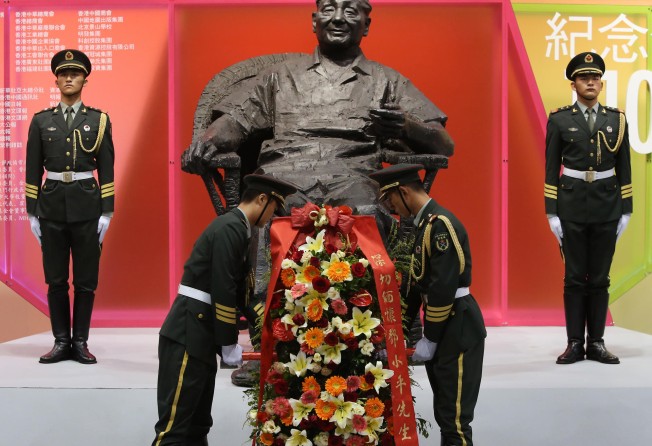Deng Xiaoping's legacy felt in Hong Kong's debate on political reform
Late paramount leader saw city as integral part of China, and Xi Jinping is of the same mind

At midnight on June 30, 1997, the Union flag was lowered and the five red stars of China were raised in a handover ceremony at the Convention Centre in Wan Chai.
There was one special guest: Zhuo Lin, widow of late paramount leader Deng Xiaoping. She was there to accomplish the last wish of Deng, who had passed away in February: to witness Hong Kong's return to China.
Many Hong Kong reporters still remember the early spring of 1997, when journalists - myself included - rushed to Beijing amid mounting rumours that Deng was seriously ill.
It was only about five months to go before July 1, and Deng had once told a city tycoon: "I'll try my best to keep alive till 1997 because I want to see Hong Kong under China's rule." Unfortunately, Deng never got his wish.
Last Friday would have marked the 110th birthday of Deng, who shaped Hong Kong's future with his "one country, two systems" policy. A series of national events celebrated the occasion, including an exhibition in Hong Kong on his connection with the city.
It revealed that Deng never had another chance to set foot here after five trips to Hong Kong during the 1920s and 30s.
However, Deng managed to take a close look at Hong Kong during his historic Southern Tour to Shenzhen in 1992, during which he reaffirmed China's open-door policy amid the then-heated debate on whether reforms would take China onto the road of capitalism.
He stressed again during the trip the need "to replicate several Hong Kongs on the mainland", hoping that would further promote China's reform.
While Deng fully appreciated the value of Hong Kong for China's economic reforms, his tough stand on Hong Kong's sovereignty was also well known. Because of it, Britain had to give up hope of keeping its administrative power over the territory after 1997.
Also because of Deng, Beijing insisted on having a military presence in the city, as a symbol of China's sovereignty, even though the PLA troops have been kept inside their barracks.
That compromise is thought to have been made largely due to Hongkongers' fear of the army after the 1989 Tiananmen crackdown on the student-led democracy movement.
We will never know whether Deng had envisaged, decades ago, that his "great invention" of "one country, two systems" would still be triggering great controversies today over interpretations of what it really means.
But Deng did predict that the implementation of this special policy would be like "crossing a river by touching the stones", since there was no precedent in history for such an arrangement.
Many debates, including the current one on 2017 universal suffrage, can be traced back to one major issue: which is to carry more weight - one country or two systems? And in what way can Beijing's emphasis on national security be reconciled with Hongkongers' expectations for two systems?
These arguments will continue in the run-up to universal suffrage, but President Xi Jinping's approving remarks about Deng clearly show that he intends to preserve the Deng legacy in all senses. Xi has even been dubbed "the younger Deng" within the party.
It is therefore expected that on the Hong Kong issue, Xi might be flexible and pragmatic, but - like Deng - will never compromise on any matter of national security. And Xi sees Beijing's rule over the city as just such a matter.
A Chinese proverb says: "Knowing yourself and your opponents is a guarantee of victory." Certainly Beijing and Xi are not our "opponents". But it is useful for Hongkongers, including the pan-democrats, to know more about Beijing's thinking under Xi.